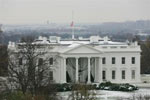 UPI: A third round of talks among Iran and six world powers on Tehran’s nuclear program is a sign of progress even with no breakthrough so far, the White House said. Uniter Press International
UPI: A third round of talks among Iran and six world powers on Tehran’s nuclear program is a sign of progress even with no breakthrough so far, the White House said. Uniter Press International
 WASHINGTON, May 25 (UPI) — A third round of talks among Iran and six world powers on Tehran’s nuclear program is a sign of progress even with no breakthrough so far, the White House said.
WASHINGTON, May 25 (UPI) — A third round of talks among Iran and six world powers on Tehran’s nuclear program is a sign of progress even with no breakthrough so far, the White House said.
“We did not expect in the prior two rounds breakthrough moments,” White House spokesman Jay Carney said after the two-day second round of talks ended in Baghdad Thursday in an impasse.
The Wall Street Journal reported Friday the talks appeared at times close to breaking down.
“What we’re looking for is progress,” Carney told reporters. “We’re looking for seriousness on the part of the Iranians in terms of addressing the concerns of the international community. And, thus far, those expectations have been met.”
The next round of talks is to take place June 18 and 19 in Moscow, Western and Iranian officials said.
Catherine Ashton, the European Union’s top foreign policy official and the lead negotiator for the six powers, told reporters each sides improved its understanding of the other’s position.
“What we have now is some common ground, and a meeting in place where we can take that further forward,” she said.
“However, significant differences remain,” she said.
Chief Iranian negotiator Saeed Jalili, the personal representative of supreme Iranian leader Ayatollah Ali Khamenei, described the talks as positive and echoed Ashton’s remarks about remaining differences.
He told reporters a key obstacle was the refusal by the United States, Russia, China, Britain, France and Germany to accept Iran’s claimed right to enrich its own nuclear fuel, which it continues to do despite four U.N. Security Council resolutions demanding it stop.
“This is our right and it is clearly irrefutable,” Jalili said.
If the six powers accept this as a right, he said, “we will of course welcome some offer to cooperate on.”
There were conflicting reports about what the six powers said they wanted Iran to do with its nuclear program.
Most reports indicated the five permanent Security Council members and Germany, known as the P5-plus-1, said they wanted Iran to stop enriching uranium to 20 percent purity levels, considered too close to weapons grade.
The New York Times said the six powers, including Iranian allies Russia and China, insisted Iran suspend all its uranium enrichment, as the Security Council has demanded.
Western powers allege Iran’ wants to make nuclear weapons. Tehran says its nuclear program is for peaceful purposes.
Iranian diplomats voiced frustration over what they said the West’s expectation of disproportional concessions while offering few incentives for Iran to make any nuclear-policy changes.
Tehran particularly wanted an EU oil embargo to begin July 1 to be scrapped or at least delayed, Iranian officials said.
The embargo is expected to endanger as much as a third of Iran’s annual revenue, the Journal said.
The six powers said the harsher sanctions would go into effect as planned.
The talks coincided with advance word the U.N. watchdog International Atomic Energy Agency would issue a report saying Iran increased the number of centrifuges inside its newest nuclear facility by almost 50 percent, to about 1,000 machines from 696 in February.
The report — which the British newspaper The Daily Telegraph said was seen as evidence Iran was steadily increasing its enrichment capacity — was expected to heighten concerns Iran’s real purpose in negotiating is to play for time while it expands its nuclear program, the Telegraph said.
Wendy Sherman, who led the U.S. delegation to the talks, was in Tel Aviv Friday to brief senior Israeli officials on the status of the Iranian diplomacy.
Israel, which considers Iran’s nuclear program an existential threat, has warned it might attack Iran militarily if it considers Iran nearing completion of a nuclear weapon or if Iran continues making 20 percent enriched uranium in protected sites that are difficult to bomb.


